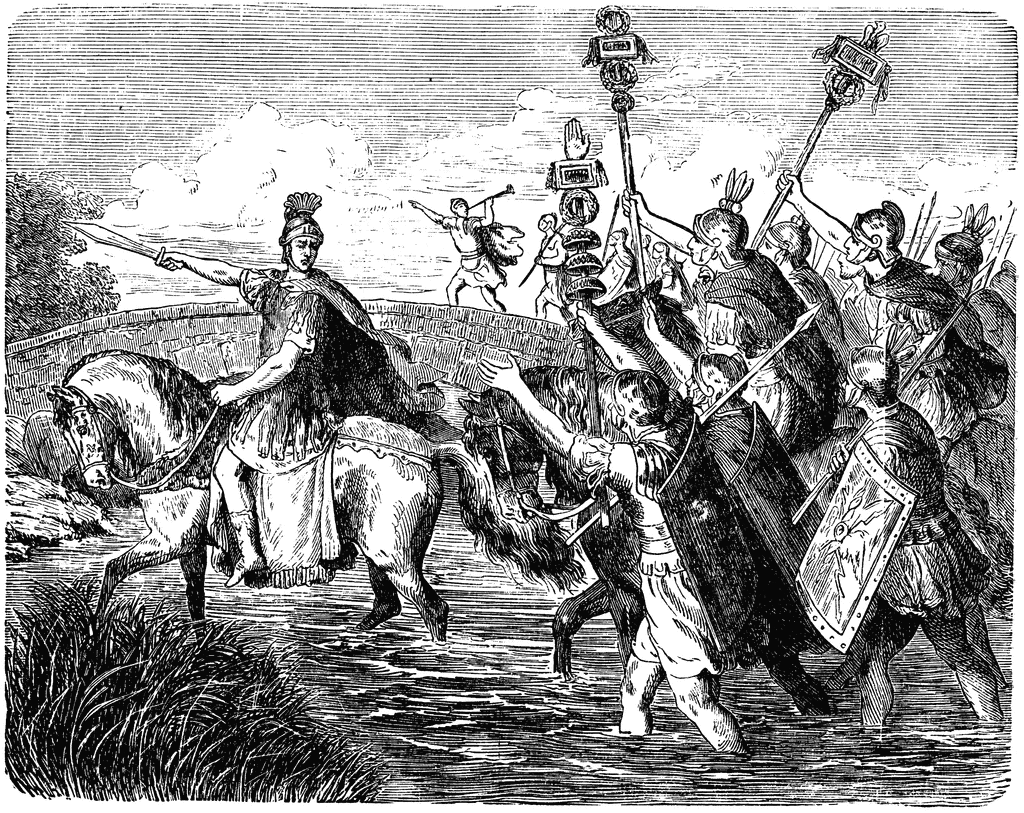I applaud the folks who have put together automatic character background generators. It’s a programming feat at the intersection of smarts and mind-numbing labor.
I have tinkered with a few of these github/google sheets generators with moral ambivalence (leaving the discussion of their legality aside), as the owner two copies of Xanathar’s Guide to Everything purchased from local game stores.
Here are my impressions.
What are they good for?
Character background generators are great for DMs rolling Non-Player Characters.
But, when you use them for Player Characters, something gets lost in translation.
What’s missing?
Players love rolling dice.
Why is this? It’s because they feel like they are manifesting the results. The die represents chance. But the player must cast the die. It doesn’t roll itself. Players influence destiny.
“Alea iacta est.”  Julius Caesar, January 10, 49 B.C.
Julius Caesar, January 10, 49 B.C.
Rubicon river, Northern Italy
In the character creation context, players get the feeling that they created the player background. Even if they didn’t toil over a typewriter in a candlelit den, wadding up paper balls of failed character narratives, they can be just as invested.
Trap Them Outside the Box
I’m a big fan of giving new players pre-generated characters, but then letting them roll Ideal/Bond/Flaw/Trait to get a feel for who they are. This gets the dice warmed up and they focus their attention on the roleplaying aspect of the character rather than the mechanics. New players who look too hard at the mechanics often get trapped inside that box, and feel like they can only do things on the sheet.
Players love the This Is Your Life section of Xanathar’s Guide because it’s a discovery process. If your players want to discover more about their character, they are going to want to have a hand in how it’s dealt.

Organic Character Discovery
Consider these two scenarios:
- When you pop out an automatic background and hand it over to a player, it’s like handing your player a lore sheet for your campaign. Nobody wants to read that crap. It’s just one more thing to do before you can get started having fun.
vs.
- If you let your player roll up a background, it becomes a discovery process. The character is the first adventure. Players invest in the character because they are peeling off narrative layers that only lead to more questions. Oh, one of my parents was an elf and the other human? Which was which? I didn’t even know one of them? Why was that? How did my parents meet? Why were they separated? Is my parent missing? Kidnapped? Who took them? Can I roll more?
Questions arising from organic character discovery lead to great roleplaying hooks that the DM can incorporate into the campaign. Players invest because their backstory hook was cast by their own hand, not contrived by DM fiat. Or, in this case, automated character generator.
Quite right, quite right I say, whilst mentally clapping. Dice create engagement and its from engagement that the magic of an RPG comes from. Otherwise I’d just power up the Xbox and enjoy a different kind of fun!
LikeLike
“The character is the first adventure.”
Adventure requires making choices. How is the character generation process an adventure? There’s a story to be found, to be sure, but what choices are presented for the player? Does he get to pick the table he rolls on? Is there an in-game association with the table?
LikeLike
I let my players use the results to start their background, like a framework. They weave the pieces into a complete story. Boon: found a treasure map, Made an Enemy: roll a random enemy… I had one player, a rogue, say they ‘found’ the treasure map, making an enemy of the druid they ‘found’ it on. Another took the banished from home (tragedy) and coupled it with something about seeing horrible visions of catastrophe and made it the reason for banishment, setting them on a wandering journey to find themselves, which ended up befriending a philosopher (befriend adventurer) that sent them to a monastery, leading them to become a monk.
The players don’t have to be bound by the tables, use them as a framework for them to create their stories in. That is where their choices lie.
LikeLike